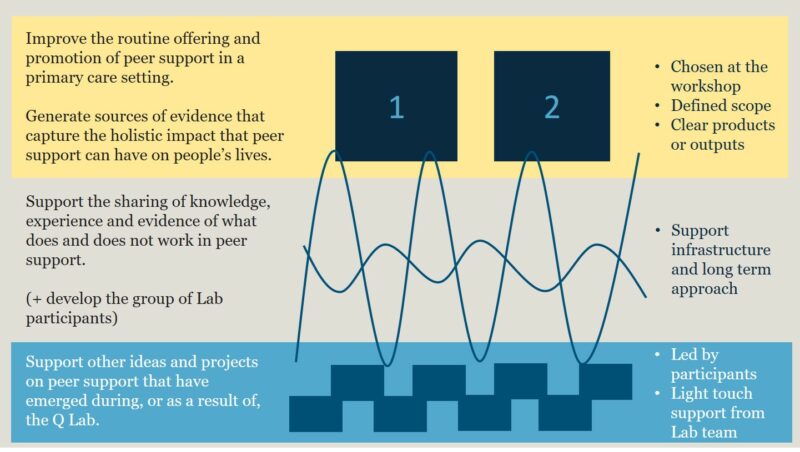The Lab was set up to make progress on complex challenges in health and care; bringing Q members and others together to draw on their collective experience and expertise. It aims to support the generation of new ideas in a way that increases the chances of ideas and approaches spreading. By this we mean incubating and supporting collaborations across organisational and professional boundaries, and providing those working with the Lab (Lab participants) with developmental opportunities to build capabilities to deal with ‘messy’ change.
We know that complex problems often have a low level of agreement about what should be done to address them, and a low level of certainty about precisely what the problem is and what is causing it . The first Lab challenge – what would it take for peer support to be available to all – certainly fits this criteria.
While there is undoubtedly a growing body of evidence about the benefits of peer support and some of the barriers to implementation, there is neither a neat nor clear consensus about what is preventing peer support from being much more widely available and how to address this.
Having spent three months pulling together some of what is known and understood about peer support and convening a group of people across the UK who are willing to work on this challenge, over the coming months we are taking forward four briefs:
- How can we improve the routine offering and promotion of peer support in a primary care setting?
- How can we generate sources of evidence that capture the holistic impact that peer support can have on people’s lives?
- How can we support the sharing of knowledge, experience and evidence of what does and does not work in peer support?
- Supporting other ideas and projects on peer support that have emerged during, or as a result of, the Q Lab.
While these may look on the surface like neat, contained packages of work, in fact the Lab – with Lab participants – is trying to weave together these four briefs and operate at different levels (local projects, research and insight generation at scale, collaboration across traditional boundaries) – see diagram below.

Piloting a new approach to complex challenges
The dominant way we think about how to affect change to solve complex challenges, and therefore how work is planned and money spent, is in time-limited projects or programmes with defined deliverables, milestones and target impacts. While this approach will work for some types of change, the Lab is piloting a new approach to making progress on complex challenges.
The Lab of course will not solve the peer support challenge in a simple or linear way; in fact there is not an ‘answer’ to this question at all.
We cannot control or simplify the range of social, structural, relational, financial (in short systemic) issues at play. None of the four briefs will be the silver bullet ‘answer’ – but by working on a number of priorities we seek to achieve impact that is greater than the sum of the parts.
The Lab will bring people together, spot fruitful connections, test a number of ideas simultaneously, allow space for open-conversation, build on and share knowledge amassed about the issue, and seek to generate broad support for an approach to tackling the problem that allows the spread of ideas to flow through the system more easily. We hope the nature of the four briefs allows us to do this.
What does success look like?
The Lab aims to catalyse change. the outcomes that we wish to see progress during the course of the 12 month pilot year, are:
- Improvements to care through the generation of new ideas and approaches. We hope to see ideas generated that can be tested during our pilot year and show promise of being applicable at scale.
- New collaborations and relationships between Lab participants, which could lead to mutual sharing of learning and the reduction of silo working
- Enhanced skills and confidence tackling complex problems amongst Lab participants, which have applicability beyond the 12 month challenge the Lab is working on.
These outcomes are one step removed from the real change we hope to see which is improved health and care for all patients and citizens. By catalysing improvements in these ways, our theory of change is that we will support Lab participants to use their agency and opportunities to improve care directly. By investing in ideas that have been shaped by a diverse range of people across the health and care system, and by investing in the people with experience, expertise and energy to work on the challenge, we are investing in improving care for patients.
If you have any questions or want to get involved, please get in touch with us: QLab@health.org.uk